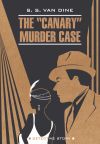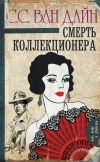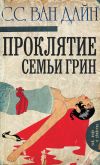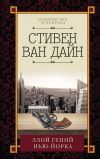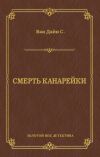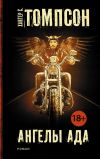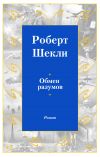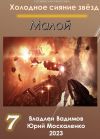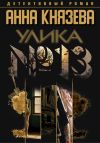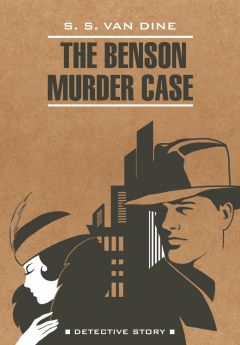
Автор книги: Стивен Ван Дайн
Жанр: Иностранные языки, Наука и Образование
Возрастные ограничения: +16
сообщить о неприемлемом содержимом
Текущая страница: 4 (всего у книги 18 страниц) [доступный отрывок для чтения: 5 страниц]
“Full,” he announced laconically.
An expression of tremendous relief spread over the woman’s features, and she sighed audibly.
Markham had risen and was looking at the revolver over Heath’s shoulder.
“You’d better take charge of it, Sergeant,” he said; “though I don’t see exactly how it fits in with the case.”
He resumed his seat, and glancing at the notation Vance had given him, turned again to the housekeeper.
“One more question, Mrs. Platz. You said Mr. Benson came home early and spent his time before dinner in this room. Did he have any callers during that time?”
I was watching the woman closely, and it seemed to me that she quickly compressed her lips. At any rate, she sat up a little straighter in her chair before answering.
“There wasn’t no one, as far as I know.”
“But surely you would have known if the bell rang,” insisted Markham. “You would have answered the door, wouldn’t you?”
“There wasn’t no one,” she repeated, with a trace of sullenness.
“And last night: did the door-bell ring at all after you had retired?”
“No, sir.”
“You would have heard it, even if you’d been asleep?”
“Yes, sir. There’s a bell just outside my door, the same as in the kitchen. It rings in both places. Mr. Benson had it fixed that way.”
Markham thanked her and dismissed her. When she had gone, he looked at Vance questioningly.
“What idea did you have in your mind when you handed me those questions?”
“I might have been a bit presumptuous, y’ know,” said Vance; “but when the lady was extolling the deceased’s popularity, I rather felt she was over-doing it a bit. There was an unconscious implication of antithesis in her eulogy, which suggested to me that she herself was not ardently enamored of the gentleman.”
“And what put the notion of fire-arms into your mind?”
“That query,” explained Vance, “was a corollary of your own questions about barred windows and Benson’s fear of burglars. If he was in a funk about house-breakers or enemies, he’d be likely to have weapons at hand—eh, what?”
“Well, anyway, Mr. Vance,” put in Heath, “your curiosity unearthed a nice little revolver that’s probably never been used.”
“By the bye, Sergeant,” returned Vance, ignoring the other’s good-humored sarcasm, “just what do you make of that nice little revolver?”
“Well, now,” Heath replied, with ponderous facetiousness, “I deduct that Mr. Benson kept a pearl-handled Smith and Wesson in a secret drawer of his center-table.”
“You don’t say—really!” exclaimed Vance in mock admiration. “Pos’tively illuminatin’!”
Markham broke up this raillery.
“Why did you want to know about visitors, Vance? There obviously hadn’t been anyone here.”
“Oh, just a whim of mine. I was assailed by an impulsive yearning to hear what La Platz would say.”
Heath was studying Vance curiously. His first impressions of the man were being dispelled, and he had begun to suspect that beneath the other’s casual and debonair exterior there was something of a more solid nature than he had at first imagined. He was not altogether satisfied with Vance’s explanations to Markham, and seemed to be endeavoring to penetrate to his real reasons for supplementing the District Attorney’s interrogation of the housekeeper. Heath was astute, and he had the worldly man’s ability to read people; but Vance, being different from the men with whom he usually came in contact, was an enigma to him.
At length he relinquished his scrutiny, and drew up his chair to the table with a spirited air.
“And now, Mr. Markham,” he said crisply, “we’d better outline our activities so as not to duplicate our efforts. The sooner I get my men started, the better.”
Markham assented readily.
“The investigation is entirely up to you, Sergeant. I’m here to help wherever I’m needed.”
“That’s very kind of you, sir,” Heath returned. “But it looks to me as though there’d be enough work for all parties. … Suppose I get to work on running down the owner of the hand-bag, and send some men out scouting among Benson’s night-life cronies,—I can pick up some names from the housekeeper, and they’ll be a good starting point. And I’ll get after that Cadillac, too… Then we ought to look into his lady friends—I guess he had enough of ’em.”
“I may get something out of the Major along that line,” supplied Markham. “He’ll tell me anything I want to know. And I can also look into Benson’s business associates through the same channel.”
“I was going to suggest that you could do that better than I could,” Heath rejoined. “We ought to run into something pretty quick that’ll give us a line to go on. And I’ve got an idea that when we locate the lady he took to dinner last night and brought back here, we’ll know a lot more than we do now.”
“Or a lot less,” murmured Vance.
Heath looked up quickly, and grunted with an air of massive petulance.
“Let me tell you something, Mr. Vance,” he said, “—since I understand you want to learn something about these affairs: when anything goes seriously wrong in this world, it’s pretty safe to look for a woman in the case.”
“Ah, yes,” smiled Vance. “Cherchez la femme[34]34
Cherchez la femme (фр.) —ищите женщину; это частое клише в детективной литературе, которое означает, что нужно найти роковую женщину, замешанную в преступление или являющуюся его причиной. Выражение стало крылатым благодаря роману Александра Дюма-отца «Могикане Парижа», в котором оно повторяется несколько раз.
[Закрыть]—an aged notion. Even the Romans labored under the superstition,—they expressed it with Dux femina facti[35]35
Dux femina facti. (лат.) —Женщина совершила действо.
[Закрыть].”
“However they expressed it,” retorted Heath, “they had the right idea. And don’t let ’em tell you different.”
Again Markham diplomatically intervened.
“That point will be settled very soon, I hope. … And now, Sergeant, if you’ve nothing else to suggest, I’ll be getting along. I told Major Benson I’d see him at lunch time; and I may have some news for you by to-night.”
“Right,” assented Heath. “I’m going to stick around here a while and see if there’s anything I overlooked. I’ll arrange for a guard outside and also for a man inside to keep an eye on the Platz woman. Then I’ll see the reporters and let them in on the disappearing Cadillac and Mr. Vance’s mysterious revolver in the secret drawer. I guess that ought to hold ’em. If I find out anything, I’ll ’phone you.”
When he had shaken hands with the District Attorney, he turned to Vance.
“Good-bye, sir,” he said pleasantly, much to my surprise, and to Markham’s too, I imagine. “I hope you learned something this morning.”
“You’d be pos’tively dumfounded, Sergeant, at all I did learn,” Vance answered carelessly.
Again I noted the look of shrewd scrutiny in Heath’s eyes; but in a second it was gone.
“Well, I’m glad of that,” was his perfunctory reply.
Markham, Vance and I went out, and the patrolman on duty hailed a taxicab for us.
“So that’s the way our lofty gendarmerie[36]36
gendarmerie (фр.) —жандармерия; внутренние войска, имеющие охранные функции
[Закрыть] approaches the mysterious wherefores of criminal enterprise—eh?” mused Vance, as we started on our way across town. “Markham, old dear, how do those robust lads ever succeed in running down a culprit?”
“You have witnessed only the barest preliminaries,” Markham explained. “There are certain things that must be done as a matter of routine—ex abundantia cautelae[37]37
ex abundantia cautelae (лат.) —из-за чрезмерной осторожности
[Закрыть], as we lawyers say.”
“But, my word!—such technique!” sighed Vance. “Ah, well, quantum est in rebus inane![38]38
Quantum est in rebus inane! (лат.) —Сколько в мире пустого! (Персий, «Сатиры», I, 1.)
[Закрыть] as we laymen say.”
“You don’t think much of Heath’s capacity, I know,”—Markham’s voice was patient—“but he’s a clever man, and one that it’s very easy to underestimate.”
“I dare say,” murmured Vance. “Anyway, I’m deuced grateful to you, and all that, for letting me behold the solemn proceedings. I’ve been vastly amused, even if not uplifted. Your official Aesculapius rather appealed to me, y’ know—such a brisk, unemotional chap, and utterly unimpressed with the corpse. He really should have taken up crime in a serious way, instead of studying medicine.”
Markham lapsed into gloomy silence, and sat looking out of the window in troubled meditation until we reached Vance’s house.
“I don’t like the looks of things,” he remarked, as we drew up to the curb. “I have a curious feeling about this case.”
Vance regarded him a moment from the corner of his eye.
“See here, Markham,” he said with unwonted seriousness; “haven’t you any idea who shot Benson?”
Markham forced a faint smile.
“I wish I had. Crimes of wilful murder are not so easily solved. And this case strikes me as a particularly complex one.”
“Fancy, now!” said Vance, as he stepped out of the machine. “And I thought it extr’ordin’rily simple.”
Chapter V. Gathering Information
(Saturday, June 15; forenoon)
You will remember the sensation caused by Alvin Benson’s murder. It was one of those crimes that appeal irresistibly to the popular imagination. Mystery is the basis of all romance, and about the Benson case there hung an impenetrable aura of mystery. It was many days before any definite light was shed on the circumstances surrounding the shooting; but numerous ignes fatui[39]39
ignes fatui (лат.) —блуждающие огни; редкие природные явления, наблюдаемые по ночам на болотах и полях
[Закрыть] arose to beguile the public’s imagination, and wild speculations were heard on all sides.
Alvin Benson, while not a romantic figure in any respect, had been well-known; and his personality had been a colorful and spectacular one. He had been a member of New York’s wealthy bohemian social set—an avid sportsman, a rash gambler, and professional man-about-town; and his life, led on the borderland of the demimonde, had contained many high-lights. His exploits in the night clubs and cabarets had long supplied the subject-matter for exaggerated stories and comments in the various local papers and magazines which batten on Broadway’s scandalmongers.
Benson and his brother, Anthony, had, at the time of the former’s sudden death, been running a brokerage office at 21 Wall Street, under the name of Benson and Benson. Both were regarded by the other brokers of the Street as shrewd business men, though perhaps a shade unethical when gauged by the constitution and by-laws of the New York Stock Exchange. They were markedly contrasted as to temperament and taste, and saw little of each other outside the office. Alvin Benson devoted his entire leisure to pleasure-seeking and was a regular patron of the city’s leading cafés; whereas Anthony Benson, who was the older and had served as a major in the late war, followed a sedate and conventional existence, spending most of his evenings quietly at his clubs. Both, however, were popular in their respective circles, and between them they had built up a large clientele.
The glamour of the financial district had much to do with the manner in which the crime was handled by the newspapers. Moreover, the murder had been committed at a time when the metropolitan press was experiencing a temporary lull in sensationalism; and the story was spread over the front pages of the papers with a prodigality rarely encountered in such cases.[40]40
Even the famous Elwell case, which came several years later and bore certain points of similarity to the Benson case, created no greater sensation, despite the fact that Elwell was more widely known than Benson, and the persons involved were more prominent socially. Indeed, the Benson case was referred to several times in descriptions of the Elwell case; and one anti-administration paper regretted editorially that John F.-X. Markham was no longer District Attorney of New York.
[Закрыть] Eminent detectives throughout the country were interviewed by enterprising reporters. Histories of famous unsolved murder cases were revived; and clairvoyants and astrologers were engaged by the Sunday editors to solve the mystery by various metaphysical devices. Photographs and detailed diagrams were the daily accompaniments of these journalistic outpourings.
In all the news stories the grey Cadillac and the pearl-handled Smith and Wesson were featured. There were pictures of Cadillac cars, “touched up” and reconstructed to accord with Patrolman McLaughlin’s description, some of them even showing the fishing-tackle protruding from the tonneau. A photograph of Benson’s center-table had been taken, with the secret drawer enlarged and reproduced in an “inset”. One Sunday magazine went so far as to hire an expert cabinet-maker to write a dissertation on secret compartments in furniture.
The Benson case from the outset had proved a trying and difficult one from the police standpoint. Within an hour of the time that Vance and I had left the scene of the crime a systematic investigation had been launched by the men of the Homicide Bureau in charge of Sergeant Heath. Benson’s house was again gone over thoroughly, and all his private correspondence read; but nothing was brought forth that could throw any light on the tragedy. No weapon was found aside from Benson’s own Smith and Wesson; and though all the window grilles were again inspected, they were found to be secure, indicating that the murderer had either let himself in with a key, or else been admitted by Benson. Heath, by the way, was unwilling to admit this latter possibility despite Mrs. Platz’s positive assertion that no other person besides herself and Benson had a key.
Because of the absence of any definite clue, other than the hand-bag and the gloves, the only proceeding possible was the interrogating of Benson’s friends and associates in the hope of uncovering some fact which would furnish a trail. It was by this process also that Heath hoped to establish the identity of the owner of the hand-bag. A special effort was therefore made to ascertain where Benson had spent the evening; but though many of his acquaintances were questioned, and the cafés where he habitually dined were visited, no one could at once be found who had seen him that night; nor, as far as it was possible to learn, had he mentioned to anyone his plans for the evening. Furthermore, no general information of a helpful nature came to light immediately, although the police pushed their inquiry with the utmost thoroughness. Benson apparently had no enemies; he had not quarreled seriously with anyone; and his affairs were reported in their usual orderly shape.
Major Anthony Benson was naturally the principal person looked to for information, because of his intimate knowledge of his brother’s affairs; and it was in this connection that the District Attorney’s office did its chief functioning at the beginning of the case. Markham had lunched with Major Benson the day the crime was discovered, and though the latter had shown a willingness to co-operate—even to the detriment of his brother’s character—his suggestions were of little value. He explained to Markham that, though he knew most of his brother’s associates, he could not name anyone who would have any reason for committing such a crime, or anyone who, in his opinion, would be able to help in leading the police to the guilty person. He admitted frankly, however, that there was a side to his brother’s life with which he was unacquainted, and regretted that he was unable to suggest any specific way of ascertaining the hidden facts. But he intimated that his brother’s relations with women were of a somewhat unconventional nature; and he ventured the opinion that there was a bare possibility of a motive being found in that direction.
Pursuant of the few indefinite and unsatisfactory suggestions of Major Benson, Markham had immediately put to work two good men from the Detective Division assigned to the District Attorney’s office, with instructions to confine their investigations to Benson’s women acquaintances so as not to appear in any way to be encroaching upon the activities of the Central Office men. Also, as a result of Vance’s apparent interest in the housekeeper at the time of the interrogation, he had sent a man to look into the woman’s antecedents and relationships.
Mrs. Platz, it was learned, had been born in a small Pennsylvania town, of German parents both of whom were dead; and had been a widow for over sixteen years. Before coming to Benson, she had been with one family for twelve years, and had left the position only because her mistress had given up housekeeping and moved into a hotel. Her former employer, when questioned, said she thought there had been a daughter, but had never seen the child, and knew nothing of it. In these facts there was nothing to take hold of, and Markham had merely filed the report as a matter of form.
Heath had instigated a city-wide search for the grey Cadillac, although he had little faith in its direct connection with the crime; and in this the newspapers helped considerably by the extensive advertising given the car. One curious fact developed that fired the police with the hope that the Cadillac might indeed hold some clue to the mystery. A street-cleaner, having read or heard about the fishing-tackle in the machine, reported the finding of two jointed fishing-rods, in good condition, at the side of one of the drives in Central Park near Columbus Circle. The question was: were these rods part of the equipment Patrolman McLaughlin had seen in the Cadillac? The owner of the car might conceivably have thrown them away in his flight; but, on the other hand, they might have been lost by someone else while driving through the park. No further information was forthcoming, and on the morning of the day following the discovery of the crime the case, so far as any definite progress toward a solution was concerned, had taken no perceptible forward step.
That morning Vance had sent Currie out to buy him every available newspaper; and he had spent over an hour perusing the various accounts of the crime. It was unusual for him to glance at a newspaper, even casually, and I could not refrain from expressing my amazement at his sudden interest in a subject so entirely outside his normal routine.
“No, Van old dear,” he explained languidly, “I am not becoming sentimental or even human, as that word is erroneously used to-day. I can not say with Terence, ‘Homo sum, humani nihil a me alienum puto’[41]41
Homo sum, humani nihil a me alienum puto. (лат.) —Я человек, и ничто человеческое мне не чуждо (высказывание св. Теренция); Цицерон и Сенека считали это высказывание принципом гуманности.
[Закрыть], because I regard most things that are called human as decidedly alien to myself. But, y’ know, this little flurry in crime has proved rather int’restin’, or, as the magazine writers say, intriguing—beastly word! … Van, you really should read this precious interview with Sergeant Heath. He takes an entire column to say ‘I know nothing’. A priceless lad! I’m becoming pos’tively fond of him.”
“It may be,” I suggested, “that Heath is keeping his true knowledge from the papers, as a bit of tactical diplomacy.”
“No,” Vance returned, with a sad wag of the head; “no man has so little vanity that he would delib’rately reveal himself to the world as a creature with no per’ceptible powers of human reasoning—as he does in all these morning journals—for the mere sake of bringing one murderer to justice. That would be martyrdom gone mad.”
“Markham, at any rate, may know or suspect something that hasn’t been revealed,” I said.
Vance pondered a moment.
“That’s not impossible,” he admitted. “He has kept himself modestly in the background in all this journalistic palaver. Suppose we look into the matter more thoroughly—eh, what?”
Going to the telephone he called the District Attorney’s office, and I heard him make an appointment with Markham for lunch at the Stuyvesant Club.
“What about that Nadelmann statuette at Stieglitz’s,” I asked, remembering the reason for my presence at Vance’s that morning.
“I ain’t[42]42
Vance, who had lived many years in England, frequently said “ain’t”—a contraction which is regarded there more leniently than in this country. He also pronounced ate as if it were spelled et; and I can not remember his ever using the word “stomach” or “bug”, both of which are under the social ban in England.
[Закрыть] in the mood for Greek simplifications to-day,” he answered, turning again to his newspapers.
To say that I was surprised at his attitude is to express it mildly. In all my association with him I had never known him to forgo his enthusiasm for art in favor of any other divertisement; and heretofore anything pertaining to the law and its operations had failed to interest him. I realized, therefore, that something of an unusual nature was at work in his brain, and I refrained from further comment.
Markham was a little late for the appointment at the Club, and Vance and I were already at our favorite corner table when he arrived.
“Well, my good Lycurgus,” Vance greeted him, “aside from the fact that several new and significant clues have been unearthed and that the public may expect important developments in the very near future, and all that sort of tosh, how are things really going?”
Markham smiled.
“I see you have been reading the newspapers. What do you think of the accounts?”
“Typical, no doubt,” replied Vance. “They carefully and painstakingly omit nothing but the essentials.”
“Indeed?” Markham’s tone was jocular. “And what, may I ask, do you regard as the essentials of the case?”
“In my foolish amateur way,” said Vance, “I looked upon dear Alvin’s toupee as a rather conspicuous essential, don’t y’ know.”
“Benson, at any rate, regarded it in that light, I imagine. … Anything else?”
“Well, there was the collar and the tie on the chiffonier.”
“And,” added Markham chaffingly, “don’t overlook the false teeth in the tumbler.”
“You’re pos’tively coruscatin’!” Vance exclaimed. “Yes, they, too, were an essential of the situation. And I’ll warrant the incomp’rable Heath didn’t even notice them. But the other Aristotles present were equally sketchy in their observations.”
“You weren’t particularly impressed by the investigation yesterday, I take it,” said Markham.
“On the contrary,” Vance assured him. “I was impressed to the point of stupefaction. The whole proceedings constituted a masterpiece of absurdity. Everything relevant was sublimely ignored. There were at least a dozen points de départ[43]43
points de départ (фр.) pl. —отправные точки
[Закрыть], all leading in the same direction, but not one of them apparently was even noticed by any of the officiating pourparleurs[44]44
pourparleurs (фр.) pl. —переговоры
[Закрыть]. Everybody was too busy at such silly occupations as looking for cigarette-ends and inspecting the ironwork at the windows.—Those grilles, by the way, were rather attractive—Florentine design.”
Markham was both amused and ruffled.
“One’s pretty safe with the police, Vance,” he said. “They get there eventually.”
“I simply adore your trusting nature,” murmured Vance. “But confide in me: what do you know regarding Benson’s murderer?”
Markham hesitated.
“This is, of course, in confidence,” he said at length; “but this morning, right after you ’phoned, one of the men I had put to work on the amatory end of Benson’s life, reported that he had found the woman who left her hand-bag and gloves at the house that night,—the initials on the handkerchief gave him the clue. And he dug up some interesting facts about her. As I suspected, she was Benson’s dinner companion that evening. She’s an actress—musical comedy, I believe. Muriel St. Clair by name.”
“Most unfortunate,” breathed Vance. “I was hoping, y’ know, your myrmidons wouldn’t discover the lady. I haven’t the pleasure of her acquaintance, or I’d send her a note of commiseration… Now, I presume, you’ll play the juge d’instruction[45]45
juge d’instruction (фр.) —следственный судья
[Закрыть] and chivvy her most horribly, what?”
“I shall certainly question her, if that’s what you mean.”
Markham’s manner was preoccupied, and during the rest of the lunch we spoke but little.
As we sat in the Club’s lounge-room later having our smoke, Major Benson, who had been standing dejectedly at a window close by, caught sight of Markham and came over to us. He was a full-faced man of about fifty, with grave kindly features and a sturdy, erect body.
He greeted Vance and me with a casual bow, and turned at once to the District Attorney.
“Markham, I’ve been thinking things over constantly since our lunch yesterday,” he said, “and there’s one other suggestion I think I might make. There’s a man named Leander Pfyfe who was very close to Alvin; and it’s possible he could give you some helpful information. His name didn’t occur to me yesterday, for he doesn’t live in the city; he’s on Long Island somewhere—Port Washington, I think.—It’s just an idea. The truth is, I can’t seem to figure out anything that makes sense in this terrible affair.”
He drew a quick, resolute breath, as if to check some involuntary sign of emotion. It was evident that the man, for all his habitual passivity of nature, was deeply moved.
“That’s a good suggestion, Major,” Markham said, making a notation on the back of a letter. “I’ll get after it immediately.”
Vance, who, during this brief interchange, had been gazing unconcernedly out of the window, turned and addressed himself to the Major.
“How about Colonel Ostrander? I’ve seen him several times in the company of your brother.”
Major Benson made a slight gesture of deprecation.
“Only an acquaintance. He’d be of no value.”
Then he turned to Markham.
“I don’t imagine it’s time even to hope that you’ve run across anything.”
Markham took his cigar from his mouth, and turning it about in his fingers, contemplated it thoughtfully.
“I wouldn’t say that,” he remarked, after a moment. “I’ve managed to find out whom your brother dined with Thursday night; and I know that this person returned home with him shortly after midnight.” He paused as if deliberating the wisdom of saying more. Then: “The fact is, I don’t need a great deal more evidence than I’ve got already to go before the Grand Jury and ask for an indictment.”
A look of surprised admiration flashed in the Major’s sombre face.
“Thank God for that, Markham!” he said. Then, setting his heavy jaw, he placed his hand on the District Attorney’s shoulder. “Go the limit—for my sake!” he urged. “If you want me for anything, I’ll be here at the Club till late.”
With this he turned and walked from the room.
“It seems a bit cold-blooded to bother the Major with questions so soon after his brother’s death,” commented Markham. “Still, the world has got to go on.”
Vance stifled a yawn.
“Why—in Heaven’s name?” he murmured listlessly.
